Category: "Beverages"
Чай (часть третья)
The Russian word for tea is чай. It declines like this:
| Sg | Pl | |
| Nom | чай | чаи |
| Acc | ||
| Gen | чая | чаёв |
| Pre | чае | чаях |
| Dat | чаю | чаям |
| Ins | чаем | чаями |
You don't usually find the plural forms, but occasionally they are used to mean ‘types of tea.’ Mostly you just use the singular.
| Фу, чай уже остыл. | Yuck, the tea has already grown cold. |
| — С чем ты любишь чай? — Я люблю чай с лимоном. |
“What do you like with your tea?” “I like tea with lemon.” |
| — Ты любишь зелёный чай? — Мне всё равно, но мне больше нравится чёрный чай. |
“Do you like green tea?” “I have nothing against it, but I like black tea better.” |
| — Я очень интересуюсь чаем. — В смысле, ты любишь чай пить? — Да нет, у меня аллергия на чай. Я интересуюсь историей чая и тем, как чай стал таким популярным в России и Средней Азии. |
“I'm really interested in tea.” “You mean you like to drink tea?” “Oh, no, I’m allergic to tea. I'm interested in the history of tea and how it became so popular in Russia and Central Asia.” |
Tea always reminds me of a classic English joke. Supposedly between Lady Astor and Winston Churchill there was constant verbal sparring:
| ЛА: Винстон, если бы я была вашей женой, я бы подсыпала яд в ваш чай. ВЧ: Мадам, если бы Вы были моей женой, я бы сразу же его выпил. |
LA: Winston, if I were your wife, I would poison your tea. WC: Madam, if you were my wife, I would promptly drink it. |

Кефир
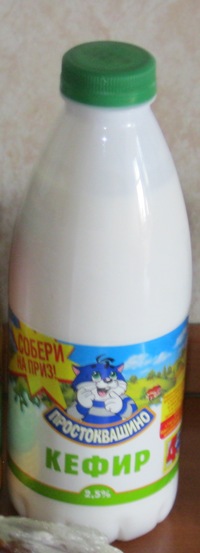 Another of the Russians' favorite fermented milk products is кефир kefir. You take milk, mix it with bacterial and yeast cultures, let it ferment for one or two or three days, and then bottle it. Usually it is made from cow's milk, but it's possible to use sheep or goat's milk as well. Compared to ряженка it is rather more acidic and slightly carbonated. The alcohol content in commercial kefir in Russia is usually less than 1%. It actually has live cultures in it, so it colonizes your gut with friendly flora that may have beneficial effects in human beings.
Another of the Russians' favorite fermented milk products is кефир kefir. You take milk, mix it with bacterial and yeast cultures, let it ferment for one or two or three days, and then bottle it. Usually it is made from cow's milk, but it's possible to use sheep or goat's milk as well. Compared to ряженка it is rather more acidic and slightly carbonated. The alcohol content in commercial kefir in Russia is usually less than 1%. It actually has live cultures in it, so it colonizes your gut with friendly flora that may have beneficial effects in human beings.
| Sg | |
| Nom | кефир |
| Acc | |
| Gen | кефира |
| Pre | кефире |
| Dat | кефиру |
| Ins | кефиром |
Most Americans' only exposure to cultured dairy products is to yogurt, usually flavored with sugar or fruit in the US, or sour cream as part of dips or dressings. So when Americans are first are exposed to kefir, they usually have a negative reaction. I didn't care for it at first, but now I really like it; and the American version that they sell in places like Whole Foods that is flavored with sugar and fruit... well, it's edible in a long-term toxic sort of way, but it's nothing like Russian kefir. Let's see some sample sentences:
| — Ты любишь кефир? — Очень. |
“Do you like kefir?” “Very much.” |
| —Ты хочешь кефира? — Хочу. |
“Do you want some kefir.” “I do.” |
| Ни в одном из магазинов белорусской столицы кефира в продаже нет. | Not a single store in the Belarusian capital has kefir for sale. |
| Скажи кефиру «Нет»! (source) | Just say ‘no’ to kefir! |
| Похудеть на кефире: всю неделю нужно пить пол-литра кефира до четырёх часов дня. (adapted from this source) | Lose weight on a kefir: all week long you need to drink half a liter of kefir by four o'clock in the afternoon. |
| Я обожаю острую пищу с кефиром — варишь макароны, на сковородке жаришь лук и красный перец, потом добавляешь черный перец, в блюдо наливаешь кефир и макароны, и со сковородки всё выкладываешь и сверху трёшь чеснок! Так остренько и вкусненько получается! (adapted from this source) | I love to make spicy dishes garnished with kefir. You boil some pasta. In a frying pan saute onions plus red pepper, then add black pepper. Into a dish you pour the kefir and the pasta, and you pour out everything from the frying pan and mince some garlic. It turns out nicely spicy and yummy! |
Now what about the nutritional value of kefir? Here's the label.

Fat — 2.5 g; protein — 2.8 g; carbohydrate — 4.0 g.
Energy value (caloric value)
per 100 g of product — 50 calories
Now that's interesting. In terms of its fat content it's about the same as ряженка.
Ряженка
The Russians drink a variety of fermented milk products and one of them is ряженка. You take milk, mix it with a bacterial culture, let it ferment for six to eight hours, then bring the process to a close. Essentially it is a type of yogurt without any flavor additives. Compared to кефир kefir, it's flavor is less acidic. We have no special word for this in English, so we usually just transliterate it as ryazhenka. It declines like this:
| Sg | |
| Nom | ряженка |
| Acc | ряженку |
| Gen | ряженки |
| Pre | ряженке |
| Dat | |
| Ins | ряженкой |
This last week I bought a packet of ряженка at the store. That's right: in Russia cold liquids are often sold in plastic packets. Here you can see it on the left. I drink about half a packet at a time, pouring it into a glass, which you can see on the left:
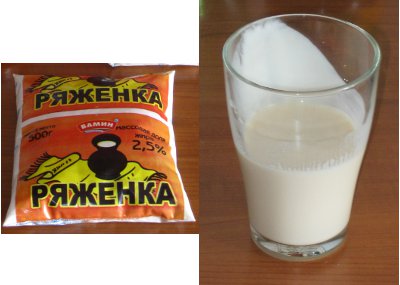
Now a thoughtful homemaker will wonder, “If it is in a floppy plastic bag, how the heck am I supposed to store an opened packet in the fridge?” Why, you stand the packet up in a mug, of course!
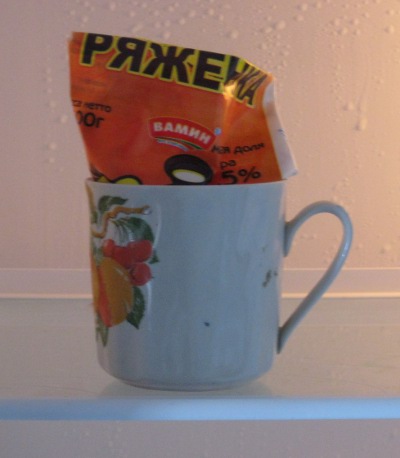
Let's see the word in some sentences:
| — Где тут можно купить ряженку? — За углом, в «Пятёрочке». |
“Where can I buy ryazhenka?” “Around the corner at the Pyatyorochka [store].” |
| Ряженка — кисломолочный напиток, получаемый из коровьего топлёного молока молочнокислым брожением. (source) | Ryazhenka is a fermented milk product made from heated cow's milk by lactic (acid) fermentation. |
| Ненавижу Америку. Там нет ряженки. А что я должна пить на завтрак? ¹ | I hate America. There's no ryazhenka there. So what am I supposed to drink for breakfast? |
| Я обожаю холодный ягодный суп с ряженкой. (recipe) | I adore cold berry soup with ryazhenka. |
Since I'm trying to limit my carb intake this summer, I of course am now wondering what the carb load is. Here's the ingredient lable. The words that appear first are in Tatar, since I am living in Kazan, and the words that follow are in Russian:
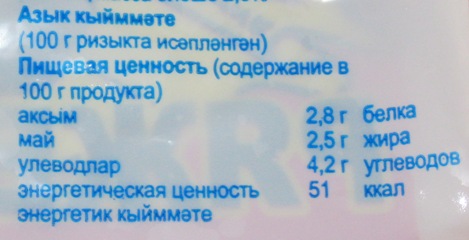
They mean:
| Nutritional value | (per 100 g) |
| Protein | 2.8 g |
| Fat | 2.5 g |
| Carbohydrates | 4.2 g |
| Calories ² | 51 |
Hm. Let's see. 100 mg of ryazhenka has 4.1 g of carbs. I'm limiting myself to 20 g of carbs a day. If a glass is 250 mg, then that's roughly 10 g of carbs for a glass of ryazhenka. Damn. That's half the day's carbs right there. Guess that means that leaves only meat and fat for the rest of the day. Actually, I can live with that.
¹ This was actually said by a Russian woman visiting the US. We had no kefir, no ryazhenka, no tvorog. It was like there was no human food there at all!
² Note to Russian readers: in the US when listing nutritional information, the word "calorie" means "kilocalorie". So for a nutritional discussion, "calorie" is a proper translation for ккал, even though in the metric system that is properly translated kilocalorie.
Компот
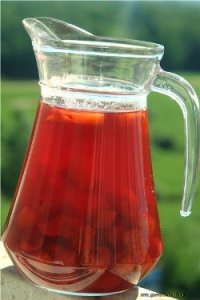 This morning I was reading about the Korean drink hwachae and realized “Hey, this is basically the same thing as компот!”
This morning I was reading about the Korean drink hwachae and realized “Hey, this is basically the same thing as компот!”
What is компот? It is a beverage made, essentially, by boiling fruit in water with some sugar and then letting the liquid cool down. You can make компот out of all sorts of fruit, fresh or dried. When you put a pitcher of it on the table, you leave the marvelous chunks of fruit in, not straining it out. The Grandma's Advice website lists the following versions:
|
|
It's a great summer drink of course, but the Russians will drink it in winter, too. Here are some sample sentences:
| Ещё компот, пожалуйста. | More compote, please. |
| Мама налила всем компот и поставила на стол тарелку с печеньем. | Mom poured compote for everybody and set a plate of cookies on the table. |
| — Очень вкусный компот! — Да, в нём и яблоки и груши. |
“Very tasty compote!” “Yes, it has both apples and pears in it.” |
| — Какой это компот? — Компот из айвы. — Я даже не знаю, что такое айва. |
“What kind of compote is this?” “Compote made from quinces.” “I don't even know what a quince is.” |
Сок (часть вторая)
Сок is the Russian word for juice.
This week I bought myself a juicer. Not just any juicer, but the one from the infomercials- Jack LaLanne's Power Juicer Deluxe!
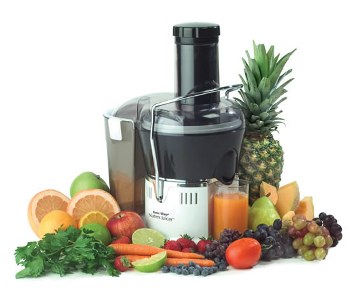
Я купилa соковыжималку высшего класса.
I bought a high quality juicer.
It was very exciting! Ok, I admit it, I love gadgets. But this one is going to change my life, I just know it. From now on, I will drink healthy. Just think of the vitamins!

Всё, с сегодняшнего дня я сажусь на соковою диету.*
That's it, I am going on an all-juice diet, starting today.
Now it was time to try out my wonderful, new, health-making juicer. So I made a vegetable juice and a fruit juice. Unfortunately, the veggie was a failed experiment. It just wasn't yummy. The fruit juice on the other hand, was a complete success!
Я сделала очень вкусный сок из яблок, апельсинов, и сливы.
I made a delicious juice out of apples, oranges, and plums.
Having completed my juicer tests, it was time to clean up. This meant taking the machine apart and doing my least favorite chore: washing dishes.
Hmmm, I think it's time to take a short break from the Juicer Deluxe. Maybe I'll change my life and get healthy next year.
За неделю все соки мне надоели.
Within a week, I was sick of all juices.
*As you may have noticed, when speaking of "going on a diet," Russians will say that they are "sitting on a diet." Almost as though they will sit down and not budge from said diet.